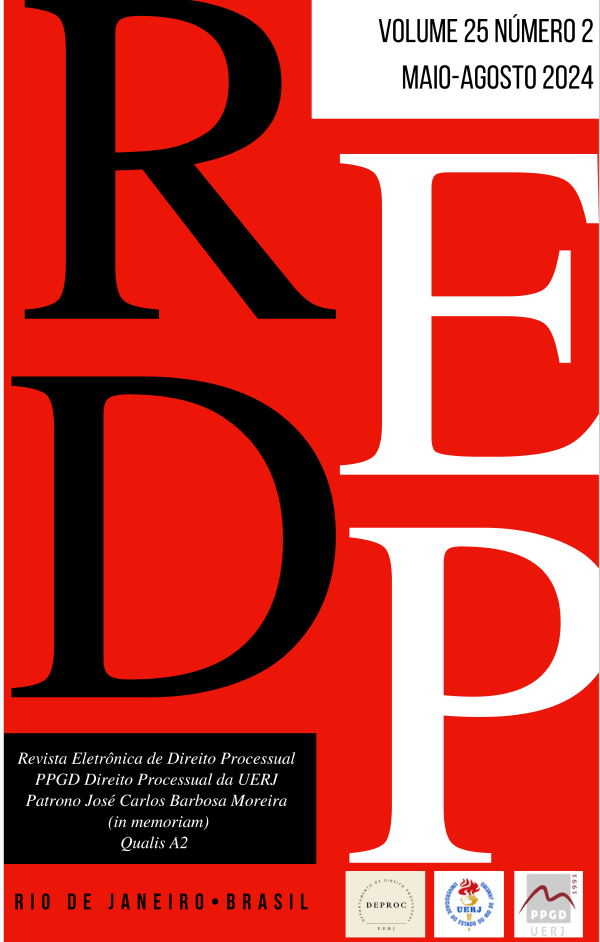COMPARATIVA ENTRE EL PROCEDIMIENTO ABREVIADO E HIPERABREVIADO IMPLEMENTADO EN EL CENTRO INTERNACIONAL DE ARBITRAJE DE MADRID (CIAM) EN MATERIA DE ARBITRAJE
DOI:
https://doi.org/10.12957/redp.2024.85254Resumo
No es nuevo que existe un flagrante colapso en el sistema judicial español, derivado de una baja inversión en medios por parte de la Administración Publica y de los Gobiernos, que se ha visto acentuada por la crisis sanitaria provocada por el Covid-19. Es por ello por lo que los métodos de resolución alternativa a la vía judicial se están extendiendo. En el preámbulo de la ley 60/2003, de 23 de diciembre de Arbitraje, se introduce que es un procedimiento que deriva de tradiciones europeas continentales y anglosajona derivada del derecho comparado aplicado. En el presente trabajo introduciré una materia como es el Arbitraje y de manera específica, trataré de explicar el procedimiento abreviado y una variante que se ha introducido en la Corte Internacional de Arbitraje de Madrid como es el procedimiento hiperabreviado. En primer lugar, me gustaría hacer una introducción en que consiste el procedimiento de arbitraje, así como plantear algunas cuestiones derivadas del principio de cosa juzgada (aspecto que podría ser objeto, no de un artículo, sino de una tesis). En segundo lugar, haré una introducción y a su vez una pequeña comparativa de los aspectos esenciales que existen entre los procedimientos abreviados e hiperabreviados. El procedimiento abreviado ofrece a las partes un arbitraje simplificado y por tanto mas eficiente, siempre amparado en las debidas garantías procesales y cuidando que exista un laudo de calidad, para procedimientos cuya cuantía sea siempre igual o inferior a 1.000.000€. En el caso del procedimiento hiperabreviado, que entrará en vigor el próximo 1 de enero de 2024, será de aplicación siempre y cuando las partes lo hayan pactado de manera expresa y siempre por escrito, y será el Centro quien determine si se acuerda la tramitación del procedimiento por la vía solicitada. Es por ello, al ser un procedimiento novedoso, donde existe una reducción manifiesta de los plazos en comparación con el procedimiento ordinario o el abreviado, lo que desarrollaré en el presente estudio, destacando los aspectos claves que entiendo que pivotan en el eje del desarrollo de este procedimiento. Para finalizar, en el marco de las conclusiones, destacaré las que entiendo que son los principales aspectos para destacar dentro del procedimiento de arbitraje en general y poniendo un mayor énfasis en el procedimiento abreviado y en el procedimiento hiperabreviado.
Downloads
Publicado
Como Citar
Edição
Seção
Licença
Copyright (c) 2024 Francisco José Álvarez Gómez

Este trabalho está licenciado sob uma licença Creative Commons Attribution 4.0 International License.
Todos os artigos publicados na Revista Eletrônica de Direito Processual (REDP) (Departamento de Direito Processual, Universidade do Estado do Rio de Janeiro, Brasil) são licenciados por meio de uma Licença Creative Commons - Atribuição 4.0 Internacional (CC BY 4.0).
Os autores retêm os direitos autorais de seu artigo e concordam em licenciar seu trabalho com a licença CC BY 4.0, aceitando assim os termos e condições específicos desta licença disponíveis no seguinte website: https://creativecommons.org/licenses/by/4.0/legalcode.
- Os autores concedem à REDP o direito de primeira publicação, de se identificar como publicadora original do trabalho e concedem à revista uma licença de direitos não exclusivos para utilizar o trabalho das seguintes formas: Reproduzir, vender e distribuir cópias eletrônicas ou impressas do manuscrito como um todo, de partes específicas do manuscrito e de suas traduções para qualquer idioma;
- O uso do artigo por terceiros é livre, contanto que a integridade da publicação seja mantida e seus autores originais, periódico de primeira publicação e detalhes de citação sejam identificados.
Dentro dos termos da licença, os autores podem entrar em acordos contratuais adicionais separados para a distribuição não exclusiva da versão publicada do trabalho na revista.
Copyright and Licensing
All articles published in the Procedural Law Electronic Review (REDP) (Department of Procedural Law, State University of Rio de Janeiro, Brazil) are licensed under a Creative Commons License - Attribution 4.0 International (CC BY 4.0).
- Authors retain copyright to their article and agree to license their work under the CC BY 4.0 license, thereby accepting the specific terms and conditions of this license available at the following website: https://creativecommons.org/licenses/by/4.0/ legal code.
- Authors grant REDP the right of first publication, to identify itself as the original publisher of the work, and grant the journal a non-exclusive license to use the work in the following ways: Reproduce, sell and distribute electronic or printed copies of the manuscript as a whole, of specific parts of the manuscript and its translations into any language;
- Use of the article by third parties is free, as long as the integrity of the publication is maintained and its original authors, first publication journal, and citation details are identified.
Within the terms of the license, authors may enter into separate additional contractual agreements for the non-exclusive distribution of the published version of the work in the journal.




